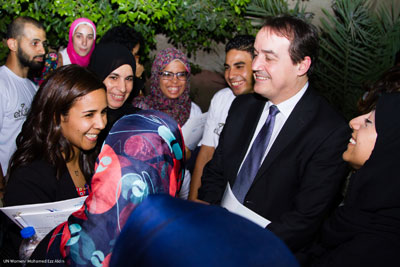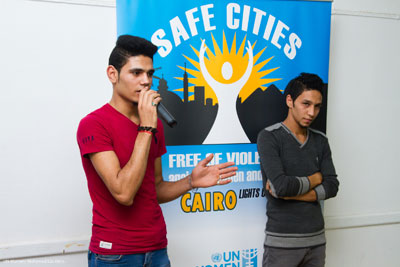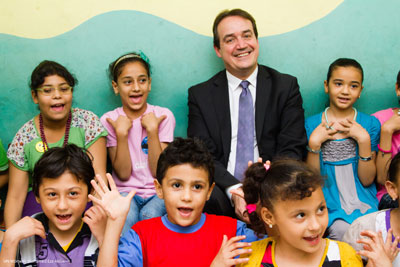Rapping and rhyming for rights: Yannick Glemarec visits programmes in Egypt
Date:
Date: Tuesday, June 30, 2015
“Be in the picture and don’t lose your rights; get out of the circle of neglect. We are encouraging you; your ID is your right it protects you,” sang Tito, a young male rapper and volunteer with Etijiah NGO, one of the main civil society partners of the Egyptian “Women’s Citizenship Initiative”. This UN Women-supported programme aims to provide identification cards to two million poor and disabled women in rural and marginalized areas in Egypt who do not have them to increase their political participation and economic opportunities.

He delivered this lyrical message during a field visit to Imbaba – one of Egypt’s most disadvantaged areas with a staggering 18 per cent unemployment rate and 26 per cent illiteracy rate – as part of the first official visit to Egypt by Yannick Glemarec as Deputy Executive Director for Policy and Programme of UN Women. He met with volunteer ‘youth ambassadors’, local NGO partners, and community members involved in two of UN Women’s key programmes in Egypt, the “Women’s Citizenship Initiative” and the “Safe Cities Free of Violence against Women and Girls.”
“Youth are a driving force for change and we are very happy today to be joining them with our partners and donors this evening,” emphasized UN Women Egypt Country Director Miwa Kato during the field visit that took place on 25 June.
Over the religious observance of Ramadan Iftar (when Muslims break their fast at sunset), Youth Ambassadors and civil society partners shared their experiences, challenges and the stories that motivate them to continue to champion women’s rights and raise awareness of the importance of supporting all Egyptians to obtain their national ID cards and live violence-free.

Alia Mokbel, Project Officer at Etijah NGO, one of the implementing partners of the citizenship initiative, highlighted: “When we first started working, two things surprised us: the first was the realization of the extent to which women and men, especially in remote villages, need national IDs and identification documents; and the second was the sincere dedication, commitment, and the enthusiasm that the Ambassadors have actually shown on the ground.”
Volunteers of the Safe Cities team in Cairo, one of UN Women’s leading global programmes, discussed how the programme has changed men’s perceptions of violence against women, beginning with the community of Tuk Tuk drivers (rickshaw drivers).
“We tried to encourage men, including Tuk Tuk drivers, to join our sessions without mentioning that these sessions will tackle violence against women,” said trainer John Milad. “I encouraged them to talk about their fears and problems freely and then indirectly dig into the problem of violence against women while engaging them in art activities like drawing and clay.”
Reflecting the resulting change in attitudes, one Tuk Tuk driver said: “I now believe that women have the right to wear whatever they want and walk in the streets equally like men without being harassed.”

Mr. Glemarec also interacted with young girls and boys who sang “I am precious”, a song about protecting themselves from sexual abuse in a simple and creative way. They were trained by the SAFE programme on child abuse, another key component of Cairo Safe City programme.
“When you face a difficult problem, either you take a lot of time or you get a lot of people on board and what is wonderful with your work is that you are bringing everybody on board so that you don’t have to wait for three or four more generations before you can make a difference,” said Mr. Glemarec, commenting on the work he witnessed during the visit.
“I would like, as a man, to celebrate the fact that there were also plenty of men and boys today, our ‘HeForShes’ who are engaging to support women’s rights. Empowering women and girls is a fight for everybody; empowering women and girls creates families and societies where it is better to live,” he added.